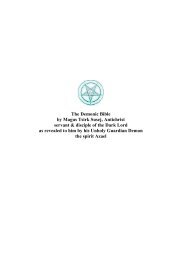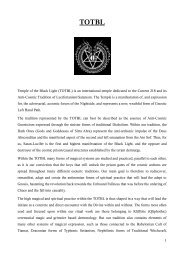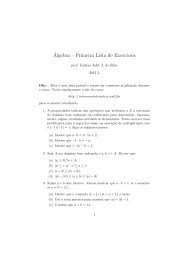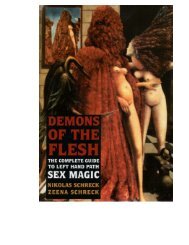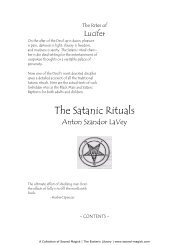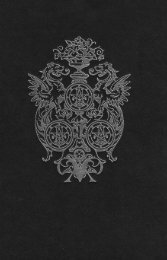Satanism Today - An Encyclopedia of Religion, Folklore and Popular ...
Satanism Today - An Encyclopedia of Religion, Folklore and Popular ...
Satanism Today - An Encyclopedia of Religion, Folklore and Popular ...
Create successful ePaper yourself
Turn your PDF publications into a flip-book with our unique Google optimized e-Paper software.
Ereshkigal 83<br />
different time periods according to the relative<br />
strength <strong>of</strong> their respective city. Thus Marduk,<br />
patron <strong>of</strong> Babylon, rose from the status <strong>of</strong> a rather<br />
obscure divinity to become king <strong>of</strong> the gods with<br />
the rise <strong>of</strong> Babylon’s political fortunes.<br />
Like the gods <strong>of</strong> the Greek <strong>and</strong> Roman<br />
pantheons, Mesopotamian divinities were pictured<br />
as human beings “drawn large.” The gods were, in<br />
other words, not much more than strong human<br />
beings, possessing magical powers <strong>and</strong> immortality.<br />
Humanity, for its part, was created out <strong>of</strong> clay<br />
to serve the gods. Unlike Judaism, Christianity, or<br />
Islam, this creation did not include the fashioning<br />
<strong>of</strong> an immortal soul. Hence the afterlife was<br />
conceived <strong>of</strong> as a pale shadow <strong>of</strong> earthly life, much<br />
like the Jewish Sheol or the Greek Hades.<br />
Mesopotamians, like many <strong>of</strong> the other traditional<br />
peoples <strong>of</strong> the world, imagined the universe<br />
as a three-tiered cosmos <strong>of</strong> heaven (above the<br />
earth), earth, <strong>and</strong> hell (beneath the earth).<br />
Heaven was reserved for deities, most <strong>of</strong> whom<br />
resided there. Living human beings occupied the<br />
middle world. The spirits <strong>of</strong> the dead resided<br />
beneath the earth.<br />
The chief deity <strong>of</strong> the Mesopotamian underworld<br />
was the goddess Ereshkigal. Although she<br />
could be harsh, Ereshkigal was not as irredeemably<br />
evil as the Christian Satan. The dead<br />
stood before her <strong>and</strong> she pronounced their death<br />
sentence. Simultaneously, their names were<br />
entered in the ranks <strong>of</strong> the dead by the scribe<br />
Geshtinana. Rather than enjoying her job, the<br />
queen <strong>of</strong> the underworld was portrayed as<br />
saddened by the fate <strong>of</strong> many <strong>of</strong> her subjects: “I<br />
weep for young men forced to ab<strong>and</strong>on sweethearts.<br />
I weep for girls wrenched from their lovers’<br />
laps. For the infant child I weep, expelled before its<br />
time” (Dalley 1989, 156).<br />
One <strong>of</strong> the more widespread Mesopotamian<br />
stories involved the descent <strong>of</strong> the goddess Ishtar<br />
to the underworld. The first version <strong>of</strong> this tale<br />
was recorded by the Sumerians, whose name for<br />
Ishtar was Inanna. The second version was a later,<br />
Akkadian text. Ishtar was the most important<br />
goddess in all periods <strong>of</strong> Mesopotamian history,<br />
the parallel <strong>of</strong> the Mediterranean Aphrodite/<br />
Venus. Precisely why Ishtar should have undertaken<br />
such a perilous journey is obscure. Some<br />
interpreters have speculated that Ishtar wished<br />
to usurp her sister <strong>and</strong> extend her rule to the<br />
underworld; others that she simply wished to<br />
visit her sister.<br />
Before embarking, she has the wisdom to<br />
inform her chief minister that she is about to<br />
undertake a journey to the underworld, <strong>and</strong><br />
instructs him to appeal to the gods in heaven to<br />
intervene should it become necessary to retrieve<br />
her from her sister’s realm. As it turns out, Ishtar is<br />
unable to return. Because Inanna/Ishtar is the<br />
goddess <strong>of</strong> sex <strong>and</strong> therefore the goddess <strong>of</strong> fertility,<br />
her absence from the earth is immediately<br />
noticed: “No bull mounted a cow, no donkey<br />
impregnated a jenny. No young man impregnated<br />
a girl. The young man slept in his private room.<br />
The girl slept in the company <strong>of</strong> her friends.” In<br />
order to reactivate the natural forces <strong>of</strong> life <strong>and</strong><br />
reproduction, the gods in heaven are forced to<br />
come to Inanna/Ishtar’s aid.<br />
The ancient Mesopotamians also told several<br />
variants <strong>of</strong> another, more upbeat, story <strong>of</strong> descent<br />
to the underworld, the tale <strong>of</strong> Nergal <strong>and</strong><br />
Ereshkigal. In this story Nergal, as a consequence<br />
<strong>of</strong> an affront to Ereshkigal’s vizier, is required to<br />
appear in the queen <strong>of</strong> the underworld’s court to<br />
<strong>of</strong>fer an apology. Ereshkigal finds herself attracted<br />
to this upper world god <strong>and</strong> attempts to seduce<br />
him by allowing Nergal, the Mesopotamian Mars,<br />
to see her undress for a bath. He resists her charms<br />
at first, but gives in on her second try. After a full<br />
week <strong>of</strong> lovemaking, Nergal steals away before<br />
dawn. When she hears that he has ab<strong>and</strong>oned her,<br />
Ereshkigal falls to the ground <strong>and</strong> cries. She then<br />
sends her vizier to heaven, dem<strong>and</strong>ing that they<br />
return Nergal to her:<br />
Ever since I was a child, I have not known the<br />
companionship <strong>of</strong> other girls. I have not<br />
known the romping <strong>of</strong> children. As mistress<br />
<strong>of</strong> the dead, I am not pure enough to take my<br />
rightful place among the other great gods. I<br />
have dwelt alone in sadness, but the god<br />
whom you sent to me has opened my heart to<br />
love. Return him to me! Return him to me or<br />
I shall raise up the dead, <strong>and</strong> they will eat the<br />
living, until the dead outnumber the living!<br />
(Dalley 1989, 173).




